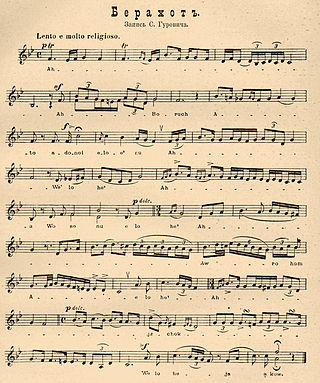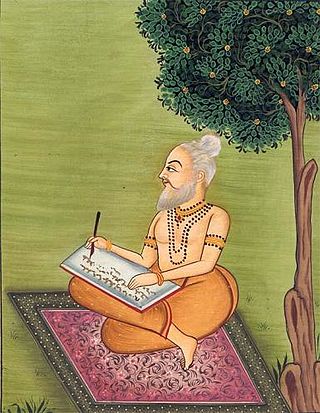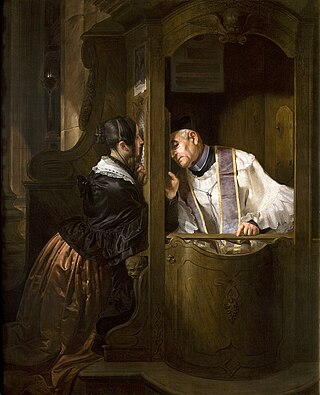
The Amidah, also called the Shemoneh Esreh, is the central prayer of the Jewish liturgy. Observant Jews recite the Amidah at each of three daily prayer services in a typical weekday: morning (Shacharit), afternoon (Mincha), and evening (Ma'ariv). On Shabbat, Rosh Chodesh, and Jewish festivals, a fourth Amidah (Mussaf) is recited after the morning Torah reading, and once per year a fifth Amidah (Ne'ilah) is recited, around sunset on Yom Kippur. Due to the importance of the Amidah, in rabbinic literature it is simply called "hatefila". According to legend, the prayer was composed by the rabbis of the Anshei Knesset HaGedolah. Accordingly, in Judaism, to recite the Amidah is a mitzvah de-rabbanan, i.e., a commandment of rabbinic origin.

The epiclesis refers to the invocation of one or several gods. In ancient Greek religion, the epiclesis was the epithet used as the surname given to a deity in religious contexts. The term was borrowed into the Christian tradition, where it designates the part of the Anaphora by which the priest invokes the Holy Spirit upon the Eucharistic bread and wine in some Christian churches. In most Eastern Christian traditions, the Epiclesis comes after the Anamnesis ; in the Western Rite it usually precedes. In the historic practice of the Western Christian Churches, the consecration is effected at the Words of Institution though during the rise of the Liturgical Movement, many denominations introduced an explicit epiclesis in their liturgies.

Maharishi Valmiki was a legendary poet who is celebrated as the traditional author of the epic Ramayana, based on the attribution in the text itself. He is revered as Ādi Kavi, the first poet, author of Ramayana, the first epic poem.
Witr is an Islamic prayer (salat) that is performed at night after Isha or before fajr. Witr has an odd number of raka'at prayed in pairs, with the final raka'ah prayed separately. Therefore, as little as one raka'ah can be prayed, and eleven at most. Most Hanafis pray 3 raka'ah with dua qunoot in the third raka'ah.

Absolution is a theological term for the forgiveness imparted by ordained Christian priests and experienced by Christian penitents. It is a universal feature of the historic churches of Christendom, although the theology and the practice of absolution vary between Christian denominations.

Ramcharitmanas, is an epic poem in the Awadhi language, based on the Ramayana, and composed by the 16th-century Indian bhakti poet Tulsidas. This work is also called, in popular parlance, Tulsi Ramayana, Tulsikrit Ramayana, Tulsidas Ramayana or simply Manas. The word Ramcharitmanas literally means "Lake of the deeds of Rama". It is considered one of the greatest works of Hindu literature. The work has variously been acclaimed as "the living sum of Indian culture", "the tallest tree in the magic garden of medieval Indian poetry", "the greatest book of all devotional literature" and "the best and most trustworthy guide to the popular living faith of the Indian people".
A Hindu wedding, also known as Vivaha, Marathi: Lagna (लग्न), Bengali: Bibaho (বিবাহ) Kalyanam or Pelli, is the traditional wedding ceremony for Hindus. The wedding ceremonies are very colourful, and celebrations may extend for several days. The bride's and groom's home—entrance, doors, wall, floor, roof—are sometimes decorated with colors, flowers, and other decorations.

Matthew 6:5 is the fifth verse of the sixth chapter of the Gospel of Matthew in the New Testament and is part of the Sermon on the Mount. This verse opens discussion on the proper procedure for praying.

Prayer is used in Scouting worldwide, following the belief of its founder, Robert Baden-Powell, that "a scout is reverent." When creating the Scouting concept, Baden-Powell was adamant that there was a place for God within it. In Scouting for Boys, Baden-Powell wrote:
We aim for the practice of Christianity in their everyday life and dealings, and not merely the profession of theology on Sundays…
In Christian liturgical worship, Preces, also known in Anglican prayer as the Suffrages, are short petitions said or sung as versicles and responses by the officiant and congregation respectively. They occur in three groups during a service: at the opening ; after the Creed, or Credo, in the middle of the service in a sequence that encompasses the Lord's Prayer and ends with the Collects; and briefly near the close. Versicle-and-response is one of the oldest forms of prayer in Christianity, with its roots in Hebrew prayer during the time of the Temple in Jerusalem. In many prayer books the versicles and responses comprising the Preces are denoted by special glyphs:

Thanksgiving after Communion is a spiritual practice among Christians who believe in the Real Presence of Jesus Christ in the Communion bread, maintaining themselves in prayer for some time to thank God and especially listening in their hearts for guidance from their Divine guest. This practice was and is highly recommended by saints, theologians, and Doctors of the Church.
Arthi is a Balmiki ritual, similar in form to the Hindu practice of Aarti in which light from wicks soaked in ghee or camphor is offered to Bhagawan Valmiki. Arthi is a form of bhakti devotion.

Vesting prayers are prayers which are spoken while a cleric puts on vestments as part of a liturgy, in both the Eastern and Western churches. They feature as part of the liturgy in question itself, and take place either before or after a liturgical procession or entrance to the sanctuary, as depends on the particular liturgical rite or use which is being observed.
Good Friday Prayer can refer to any of the prayers prayed by Christians on Good Friday, the Friday before Easter, or to all such prayers collectively.

The Vithoba Temple, officially known as Shri Vitthal-Rukmini Mandir, is a Hindu temple in Pandharpur, in the Indian state of Maharashtra. It is the main centre of worship for Vithoba, a form of the god Vishnu or Krishna, and his consort Rakhumai. It is Classified one among the 108 Abhimana Kshethram of Vaishnavate tradition. The temple was built by King Vishnuvardhana of Hoysala Empire between 1108 and 1152 CE upon being convinced by the historical figure Pundalik. Also, there is an inscription in the temple, of a Hoysala King Vira Someshwara dating back to 1237 CE, which grants the temple a village for its upkeep. It is the most visited temple in Maharashtra. The Warkaris start marching from their homes to the temple of Pandharpur in groups called Dindi (procession) to reach on Aashadhi Ekadashi and Kartiki Ekadashi. A dip in the holy river Chandrabhaga, on whose banks Pandharpur resides, is believed to have power to wash all sins. All the devotees are allowed to touch the feet of the idol of Vithoba. In May 2014, the temple became the first in India to invite women and people from backward classes as priests.
Coronation Ode, Op. 44 is a work composed by Edward Elgar for soprano, alto, tenor and bass soloists, chorus and orchestra, with words by A. C. Benson.
In Lutheranism, the Eucharist refers to the liturgical commemoration of the Last Supper. Lutherans believe in the real presence of Christ in the Eucharist, affirming the doctrine of sacramental union, "in which the body and blood of Christ are truly and substantially present, offered, and received with the bread and wine."

Among Eastern Orthodox and Eastern-Rite Catholic Christians, holy water is blessed in the church and given to the faithful to drink at home when needed and to bless their homes. In the weeks following the Feast of Epiphany, clergy visit the homes of parishioners and conduct a service of blessing by using the holy water that was blessed on the Feast of Theophany. For baptism, the water is sanctified with a special blessing.
Kumayl bin Ziyad an-Nakha'i was among the most loyal companions of Imam Ali Ibn Abi Talib. Moreover, Kumayl occupies a prominent position in Shia Islam. Converting to Islam during the time of Islamic prophet Muhammad, he rose to a position of prominence during the caliphates of Uthman and Ali. In the caliphate of Ali, Kumayl flourished and served him in the most disciplined of ways. However, he is recognized for his pious and humble nature as well as preserving Imam Ali's teachings. Kumayl is best known for the du'a (supplication) of Prophet Khidr, which is commonly known by the name du'a Kumayl.

The Will (Book)










